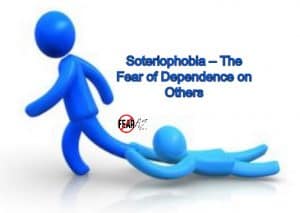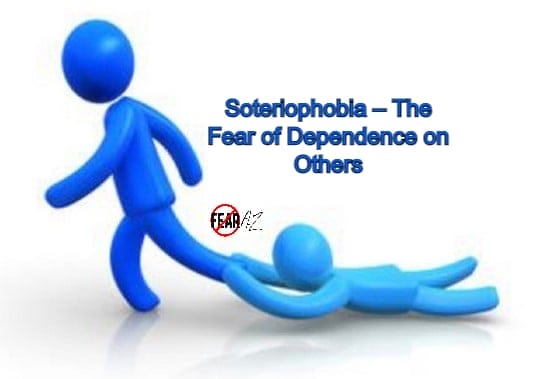Share This Article
Soteriophobia: The Fear of Dependence on Others
Do you dread the thought of accepting someone else’s help?
Do you avoid being around people to avoid becoming dependent on them? If the answer is yes, you may have soteriophobia.
If you get cold feet by simply thinking about taking the assistance of others in certain situations, there may be something deeper at work.
For some, it’s harmonious living and a give-and-take relationship with others. But for those suffering from soteriophobia, it’s a different story.
Being dependent on others should not be that hard. But the dread of depending on others may make it seem otherwise. Fortunately, like many other phobias, soteriophobia too is treatable. Now, let’s explore the fear to learn how to overcome it.

What Is Soteriophobia?
Soteriophobia is the fear of dependence on others. Sufferers feel extreme dread when they have to accept help or depend on someone, even when it’s for the best. Soteriophobia is a social phobia. Social phobias are phobias where sufferers dread social situations or other people. It can be performance anxiety or their fear of embarrassing or humiliating themselves. Some common examples of social phobias are the fear of public speaking, eating in public, etc.
When it comes to soteriophobics, many prefer free will and self-sufficiency and have a strong aversion towards dependency. They feel threatened when they think of being dependent on others. Usually, social phobics avoid the social situations that cause them dread. They may avoid getting into situations where they may need the help of others, which can result in seclusion and conflicting feelings of isolation. These behaviors become repetitive, worsening the phobia. Sufferers keep avoiding their phobia compulsively to eliminate anxiety which can even lead to the development of obsessive-compulsive disorder.
What Causes Soteriophobia?
Soteriophobia causes are similar to that of other phobias, although they may be more complex given it is a social phobia. Social phobias can develop because of one’s heredity, genetics, and brain chemistry combined with traumatic events that trigger the phobia. However, genetics and trauma working in tandem appear to be the primary cause of phobias such as soteriophobia.
Genetics
Someone with a family history of mental illnesses like anxiety disorders or specific phobias is at a higher risk of developing phobias such as soteriophobia, because they have a genetic predisposition towards it. But genetics alone cannot develop a phobia. It generally requires a triggering event that instigates anxiety related to dependency.
Trauma
A traumatic experience can serve as a triggering event. It can be anything that caused an imbalance in one’s mental stability. For example, you might have suffered through being dependent on others in the past, such as during a toxic relationship or a difficult childhood. The trigger event can also be a story you heard of someone’s dependency gone wrong, a story of someone being exploited after depending on others.
Personality
Soteriophobia isn’t necessarily event driven. Some people can have strong personalities and require a certain degree of control and power over their life circumstances. Over time, this too can get reinforced to the extent where a person develops a strong, irrational aversion towards being helped or ending up in a situation where they are dependent on others, such as when recovering from an injury or illness.
Associated Mental Conditions
Someone suffering from other untreated mental conditions is also at the risk of soteriophobia. It can be autism spectrum disorder, schizophrenia, or bipolar disorder left untreated that leads to soteriophobia.
Age
Soteriophobia is common among children aged 13-18 years. Since they are at their peak teen years and striving to gain more control over their lives, anything that curbs their freedom can seem terrifying. Elderly people who were once independent and lived strong individual lives are also at the risk of soteriophobia. This is because as they age they are forced to accept the help of others and be dependent. It may result in the pushing away of children or partners when offered physical or emotional assistance as they face the challenges of old age.
What Are the Symptoms of Soteriophobia?
If you feel worried at the thought of taking others’ guidance and help it may be a sign of soteriophobia. Other behavioral signs to watch for are:
- You try to do everything by yourself
- You refrain from meeting people altogether
- You don’t ask for help when you need it
- You feel threatened at the thought of being dependent
- You avoid situations where you might need to ask for others’ help
Other than extreme anxiety, the following are some physical, mental, and emotional soteriophobia symptoms.
Physical Symptoms
- Increased heart rate
- Dizziness
- Breathlessness
- Hot or cold flashes
- Headache
- Nausea
- Tremors
- Tingling or numbness
- Butterflies in the stomach
- Excessive sweating
Mental/Emotional Symptoms
- Panic attacks
- Withdrawal
- Inability to handle anxiety
- Difficulty concentrating
- Anger or mood swings
- Guilt or sadness
The severity of these symptoms depends on the individual, the intensity of their fear, how they perceive the situations, and past trauma. One has to have at least six months of consistent symptoms to be diagnosed with soteriophobia.
How to Treat Soteriophobia?
There is no one specific soteriophobia treatment for soteriophobia. Nevertheless, you can take various initiatives on a personal level to improve the symptoms, or you can seek professional help. There are different forms of treatments that can significantly make a difference in your soteriophobia symptoms.
Self-Help Guide to Soteriophobia
Those with soteriophobia want to practice free will, and if that is threatened they feel extreme anxiety. So, perhaps you can accept your own help to eliminate anxiety if your phobia is mild. There are various techniques that—with consistency—reduce stress significantly.
Do Strenuous Exercises
Anxiety disorders like soteriophobia benefit from exercise. Cardio relieves stress by releasing “happy hormones,” such as dopamine and serotonin in the brain, easing the pain related to anxiety. Aerobic exercises and other strenuous exercises put your body under stress and you cope with it. Your body then adapts to cope with stressful situations.
Practice Yogic Poses
Yoga poses put you in a meditative state of mind with consistent practice. With yoga, you learn to redirect your energy to something more positive.
Cut Caffeine
Large amounts of coffee throughout the day can make you more anxious than you generally would be. Caffeine adds to your already heightened anxiety and is best done without when you have soteriophobia. Being aware of your daily consumption of caffeine can reduce some symptoms of soteriophobia.
Meditate
Meditation, no doubt, works best when you master it. Anxiety disorders like soteriophobia put your mind in a constant state of mental anguish. Because of this, you can benefit from meditation. It allows you to cope with stress by teaching your body how to calm itself by focusing on something such as breathing. It activates all five senses and leaves little space for anxiety.
Professional Help for Soteriophobia
When soteriophobia starts affecting one’s social and professional life, treatment becomes necessary. Seeking professional guidance can help you understand your fear more deeply and get you to the root of it. If you believe you have soteriophobia and are enduring its symptoms, consult your mental health professional to get properly diagnosed and treated.
Some of the most widely used professional techniques to treat soteriophobia are:
- Talking therapy
- Exposure therapy
- Cognitive behavioral therapy
- Dialectical behavior therapy
- Mindfulness-based stress reduction
- Neuro-linguistic programming (NLP)
- EMDR
How to Cope with Soteriophobia
By now, you should know that soteriophobia can impair one’s daily life. So how do you vanquish it? Explore your fear, acknowledge it, and start your path to recovery now. Your recovery starts the day you acknowledge your fear and take small steps to try to beat it. It may seem hard at first, but with consistent efforts, you can overcome it.
You can try to make the following changes in your routine to make recovery easier:
- Stop rationalizing your fear
- Try and find the gap in your thoughts
- Allow yourself to be; don’t push changes too hard
- Stop resorting to avoidance behaviors
- Give yourself time and space
- List down positive things about people
- Try and know yourself. Know what will make you calm in stressful times.
Wrapping Up
Being dependent on others and accepting their help without being afraid of them exploiting you can seem impossible, but it’s not. You decide when you want to fight this fear. It is one borne in your mind and only your mind can overcome it. Living in harmony with others and being dependent when needed, in good faith, will come easily once you decide you’re ready.




